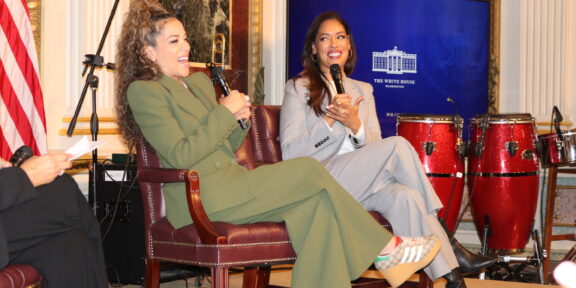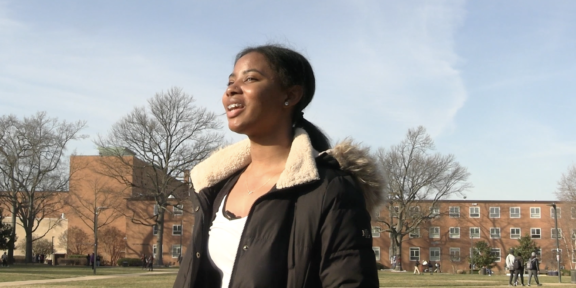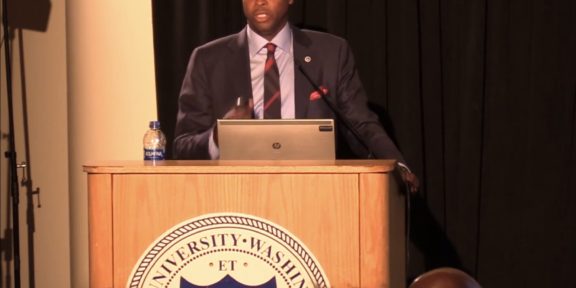Video By Azaria Jackson, NewsVision Reporter
Written By: Jada Ingleton, Howard University News Service Reporter
What started as a publication for registration follies and campus events soon became an established and respected media source to advocate for Black voices.
In honor of the centennial anniversary, a celebratory gala was held at the National Press Club on Feb. 3. A ballroom full of past and present Hilltop journalists and supporters gathered to commemorate 100 years of The Hilltop newspaper.
Co-founded in 1924 by Harlem Renaissance writer Zora Neale Hurston and renowned anthropologist Louis E. King, The Hilltop is the nation’s oldest and largest Black collegiate newspaper for the Howard University community and beyond.
“It’s just exciting to see that this publication has been around for 100 years,” associate professor and former news producer at the University of Alabama, Dr. George Daniels, said. “I do a lot of visits to HBCUs and other universities–they celebrate their media outlets, but there’s none like The Hilltop.”
Daniels, the newspaper’s editor-in-chief from 1991 to 1992, was just one of many Hilltop alumni present at the event. In part with the centennial year’s theme of “Honoring our Past. Celebrating our Future,” generations of Hilltoppers returned home to honor the legacy of Hurston and King’s vision.
Isabel Wilkerson, former Hilltop editor-in-chief, award-winning author, and the first Black woman in American journalism history to win a Pulitzer Prize, served as the gala’s keynote speaker.
“The great thing about this weekend [was] coming together and celebrating The Hilltop. it really was coming back and being with family [and] just being wrapped in the warm embrace of family and love,” said Desiree Hicks, senior supervising editor for enterprise at NPR, who began writing for The Hilltop under Wilkerson’s administration. “You don’t replace that. That’s everything.”
Hicks, who did not join The Hilltop until the spring semester of her freshman year, recalls having to work for her position as a staff writer after initially being turned down due to a longstanding tradition of not permitting freshmen.
She said she credits the experience with teaching her the value of perseverance–a lesson that has stuck throughout her career in journalism and life. She went on to become The Hilltop’s campus editor her senior year.
The gala consisted of guest speakers, award distributions, and even a triumphant “Hilltop!” chant as this year’s staffers gathered for pictures. Current and former Hilltoppers were celebrated with superlatives and awards in honor of the historic occasion and often could be seen embracing one another with warmth after receiving the awards.
JD Jean-Jacques, the Hilltop campus editor, won the Percy Newbie Award, an award for a student who dedicates themselves to journalism and fair, honest reporting. Jean-Jacques told HU News Service it was “such an honor” to be able to receive it.
“This is a wonderful event. It recognizes the wonderful things that The Hilltop represents,” 1984 managing editor and current communications strategist Joyce Harris said. “For the Black press, it still remains a role, and we have to keep pressing forward to not let that die. We cannot lose true stories. It’s an important part of democracy.”
“Seeing the commitment, seeing the professionalism, the love and appreciation for what The Hilltop means, what that legacy stands for, and how important it is to preserve that and pass it on to those who will come next,” Hicks said. “To have played a small part in that all these years later, it’s still humbling.”
Past and current members of The Hilltop say they hope for the next 100 years of truth and ground-breaking journalism. As current staffers try to fulfill the publication’s purpose, the protection of the
“The Hilltop has this amazing legacy, and it’s clear that it’s in good hands. It’s incumbent upon all of us to show up and be supportive of this jewel,” Hicks explained. “[We] have to do our parts to make sure that it continues to thrive for the next 100 years and beyond.”













